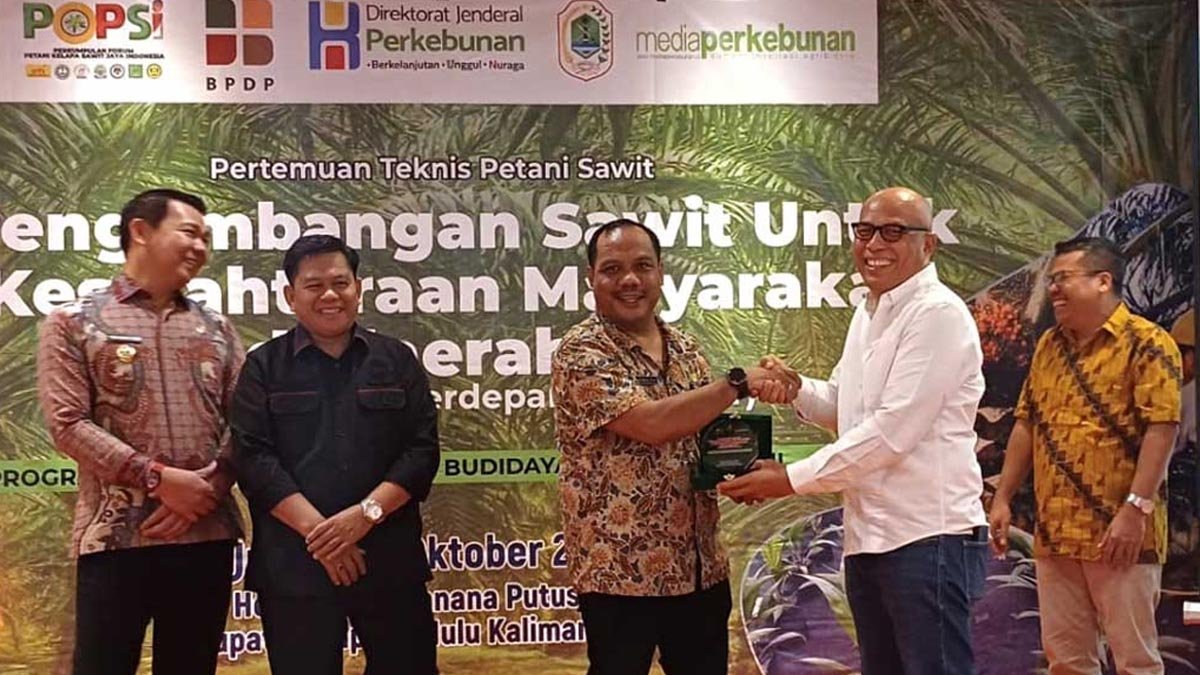PALMOILMAGAZINE, KAPUAS HULU — Amid the lush landscapes of the Heart of Borneo, smallholder oil palm farmers in Kapuas Hulu, West Kalimantan, are striving to balance economic well-being with environmental preservation. In a region where more than half the area is classified as protected forest, cultivating oil palm is not merely an economic pursuit—it is a matter of ecological survival and sustainable livelihoods.
Recognizing these challenges, the Indonesian Palm Oil Association (IPOA or GAPKI) has stepped forward with concrete support. During the Smallholder Technical Meeting held on October 30, 2025, in Putussibau, GAPKI emphasized the importance of multi-stakeholder collaboration to build a truly sustainable palm oil sector. The event, themed “Developing Palm Oil for Community Welfare in Frontier, Outermost, and Least-Developed Regions (3T),” was initiated by the Forum Petani Kelapa Sawit Jaya Indonesia (POPSI) with strong support from the Kapuas Hulu Regional House of Representatives (DPRD) Chairman, Yanto SP.
“Smallholders are the backbone of sustainability. They need not only quality seedlings but also protection, social security, and knowledge on decent work practices,” said Sumarjono Saragih, GAPKI’s Head of Human Resource Development and Co-President of JAGA SAWITAN, in an official statement received by Palmoilmagazine.com on Monday (Nov 3, 2025).
The JAGA SAWITAN initiative—short for Jaringan Ketenagakerjaan untuk Sawit Berkelanjutan (Sustainable Palm Oil Labor Network)—serves as a collaborative platform between GAPKI and the workers’ union JAPBUSI. It provides an open space for discussion on labor-related issues within the palm oil sector to seek collective solutions.
According to GAPKI, a similar approach could be effectively adapted in Kapuas Hulu, where the intersection between conservation and community welfare presents unique challenges. “A structured multi-stakeholder dialogue is essential for continuity and measurable outcomes. If we have JAGA SAWITAN at the national level, Kapuas Hulu could develop its own local model called ISAKU—Inisiatif Sawit Berkelanjutan Kapuas Hulu,” Sumarjono explained.
Interestingly, ISAKU, which sounds like “my village” in Indonesian, is envisioned as a platform uniting farmers, local governments, NGOs, and businesses in promoting sustainable palm oil practices. The concept aligns closely with the Prabowo–Gibran administration’s Asta Cita vision, which prioritizes rural-centered development as a national agenda.
The event in Putussibau drew more than 150 smallholders, reflecting strong enthusiasm for the future of sustainable palm oil. Kapuas Hulu Regent Fransiskus Diaan also attended the event, emphasizing the urgent need to protect farmers from the widespread circulation of counterfeit seedlings.
With growing support from GAPKI, POPSI, and other stakeholders, Kapuas Hulu now has the opportunity to become a model for integrating rural economic growth with forest conservation. For local communities, palm oil is not just a commodity—it represents hope, progress, and a sustainable future for the “lungs of Kalimantan.” (P2)
